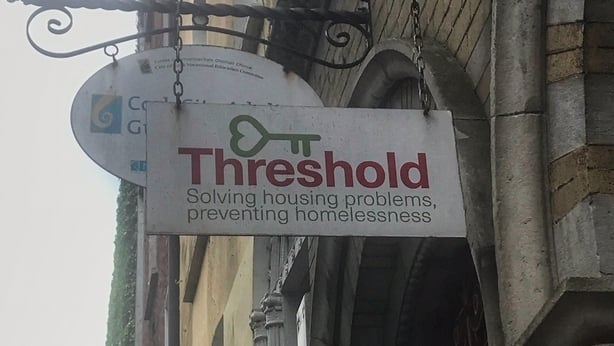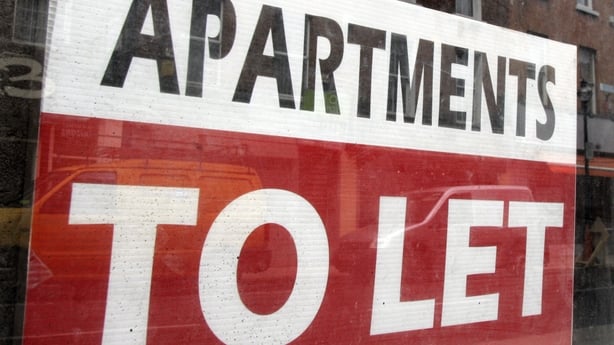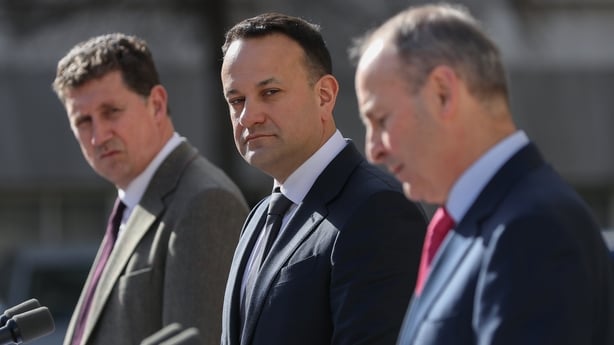The Government will tomorrow discuss ending the evictions ban at the end of the month, but some renters could remain in homes until June.
The ending of the moratorium on a phased basis out to June is already provided for in the legislation.
Tonight, Minister for Housing Darragh O'Brien discussed the winter eviction moratorium with the three Government party leaders.
"It was agreed that Mr O’Brien would bring a detailed memo to Cabinet tomorrow morning where there will be further discussions with Government colleagues," a spokesperson said.
The Cabinet is likely to discuss plans for a budgetary package for both tenants and landlords which would be developed over the coming months.
These include giving tenants first refusal on purchasing their home if the landlord is selling it, or secondly, that it should be offered to an Approved Housing Body which would allow the tenant to continue living in it.
Social housing targets are also likely to be updated and social home acquisitions will be increased to 1,500 in 2023.
Homelessness campaigner Fr Peter McVerry criticised the move, saying the ban has been "very effective".
Speaking on RTÉ's Upfront with Katie Hannon: "Well on their own head (Government) be it. The majority of people becoming homeless today are from the private rental sector, so clearly the ban on evictions is preventing people from becoming homeless."
I've been a strong advocate for this ban to be extended and I'm very disappointed that it's not. It's becoming clearer to me that this Government are on the side of the owners of capital, on the side of big international investment funds, who love to see rents going up and on the side of the banks who love to see property prices going up."
Fr McVerry said many of the people he works with are from low rental households cannot even afford to get into the private rented sector.
Not a 'black and white' issue - Taoiseach
Speaking in Waterford earlier today, Taoiseach Leo Varadkar said it will be a matter for the Cabinet to weigh up the pros and cons of the current ban on evictions and to make a decision tomorrow morning on what the next steps should be.
Mr Varadkar said anyone following the debate understands it is not a black and white issue.
The Taoiseach would not speculate on whether there would be exemptions for landlords to move into their own properties or to move family members into their properties, because that pre-supposed that the ban on evictions would be continued.
"We haven't made a decision yet on whether or not to continue the eviction ban," Mr Varadkar said.
"There are a number of options as, I think, everyone understands. There are pros and cons here.
"No matter what we do, it will have both positive and negative effects, so we have to make the decision in the interest of the wider public good, but that decision is not made until tomorrow."
Mr Varadkar highlighted that the number of people in emergency accommodation provided by the State had increased each month since the ban had been imposed. He said this was a disappointment.
Taoiseach Leo Varadkar has said it will be a matter for the Cabinet to weigh up the pros and cons of the current ban on evictions and to make a decision tomorrow morning on what the next steps should be | https://t.co/fKMDhWWtYL pic.twitter.com/P8QmFSGUC6
— RTÉ News (@rtenews) March 6, 2023
Sinn Féin has described the planned end of the evictions ban a "disaster" and said it should be extended until the end of the year.
Spokesperson on Finance Pearse Doherty told RTÉ's Upfront with Katie Hannon: "This decision is a disaster for thousands of people who have an notice to quit, who over the next number of months now will find themselves without rental accommodation."
He said the numbers in emergency accommodation had never been as high, including those with children and he said the reason for this was that there was no other accommodation.
"Somehow in the wisdom of Fine Gael, Fianna Fáil and the Greens, they think that by lifting this ban, that somehow everything will be ok. It won't. There is no accommodation for them. They won't find rental accommodation and there is no emergency accommodation."
Mr Doherty said the same reasons existed today as when the ban was introduced. "We're in the middle of a cost of living crisis, we're in the middle of a housing crisis, this is an emergency."
He called for a "Covid-like" response to be used to provide more accommodation adding: "There's no point kicking the can down the road unless you do something in the middle of it."
Landlords and international investors had the strongest voice in this, he added.

'Least worst move' - Threshold
CEO of housing charity Threshold John Mark McCafferty said that extending the eviction ban beyond March would be "the least worst move".
Speaking on RTÉ's News at One, Mr McCafferty said he understands that there could be negative consequences on either side of the equation, but it is clear that renters have very few options.
He said it is about finding solutions and dealing with issues like supply, short-term lets and tax.
"The renters that we are assisting and advising are renting from small landlords, landlords with one or two properties, and a number of them are leaving," he said.
"With the changes in legislation, further small landlords will leave and that makes supply even worse in the medium-term.
"A number of changes need to be instigated in the next few months, and I think we also need reassurance from the department about enough emergency accommodation coming onstream if the eviction ban ends at the end of March.
"We know from working with renters that many of them have nowhere to go if their tenancy ends. They won't be able to find housing elsewhere because there simply isn’t supply, and we’re hearing that emergency accommodation at local authorities is up to capacity.
"There are real worries there for families and individuals who are renting and are worried about losing their home over the coming months."
Eviction ban hasn't achieved 'what it was set up to do'
The eviction ban "has had very little effect" on what it was supposed to do, said Institute of Professional Auctioneers and Valuers CEO Pat Davitt.
Mr Davitt said it was hoped that the ban would give the Government time to get more housing onto the market and cut the homeless numbers, but the numbers have continued to rise and very little additional stock has come on stream.
Speaking on RTÉ's Drivetime, he said that while one could make the argument that five months is too short, it "certainly hasn’t helped from what it was set up to do".
"The only thing it has done is left landlords who want to get their properties back not being able to get them," he said.
"So that’s going to happen whenever the eviction ban is lifted, whether it’s now or at the end of the year."
Speaking on the same programme, the Executive Director of the Simon Community said the ban was brought in as a "crisis response to a crisis" and the circumstances that necessitated it have not changed.

Wayne Stanley said the ban "did do what it was designed to do" in that it kept those who were at risk of homelessness in their home, and he hoped it would be extended.
He said there "absolutely" would have been a much bigger rise in homelessness had the ban not been put in place.
"[If] we lift the moratorium now ... homeless numbers will continue to increase, we will be stretched beyond capacity," he said.
"What that will mean is, there will be an irrefutable call for the moratorium to be put back in place, so that security that landlords and letting agents are looking for won’t happen unless we get ahead of it."

Last night two Green Party TDs Neasa Hourigan and Patrick Costello expressed concern that the Government might lift the eviction ban in its entirety.
Speaking on RTÉ's Morning Ireland, Ms Hourigan said that lifting the ban, combined with pressure to house people fleeing the war in Ukraine, would lead to a jump in homelessness figures.
"We are already dealing with less hotel rooms," she said.
"We are already under pressure from people fleeing the war in Ukraine. I'm not sure full-scale lifting of the ban is an incredibly good idea right now.
"And certainly it will see a jump in homelessness figures and further pressure on services, which I have to say right now are already under a huge amount of pressure."
She acknowledged that the ban, in its current form, cannot stay in place forever.
"The eviction ban is like first aid for patients because we're in the middle of a crisis. But we do need the radical surgery of policy change going forward."
Abolition of hospital charges on Cabinet agenda
Meanwhile, public hospital inpatient charges are set to be abolished from April as part of legislation Minister for Health Stephen Donnelly will bring to Cabinet tomorrow.
The Government is expected to sign off on the Health Amendment Bill, which will end the statutory public inpatient charge of €80 per day, up to a maximum of €800 in a year.
This new legislation will mean that people will no longer be charged when accessing inpatient care in public hospitals.
The removal of these charges was announced as part of the Budget with funding of €21 million provided for this year.
The estimated full-year cost is up to €32 million.
Minister Ryan also confirmed he will bring a memo to Cabinet tomorrow with proposals for higher congestion charges, parking charges and fuel price increases.
"That is what our study is looking at: how we manage demand for traffic and greenhouse gas emissions and also to make sure we don't all get stuck in gridlock," he said.
Additional reporting Paul Cunningham and Paschal Sheehy






